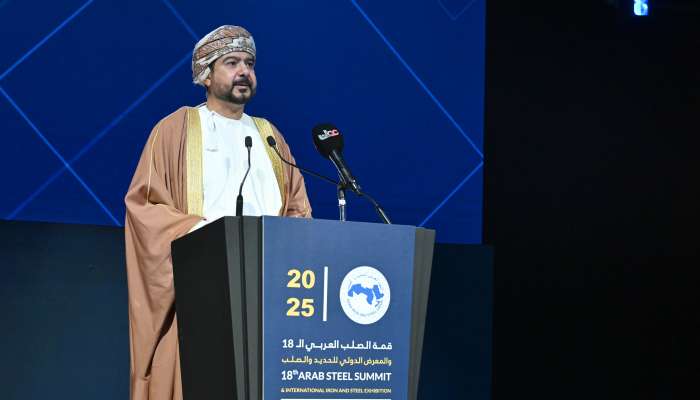
Muscat: The Arab Steel Summit 2025, hosted by the Sultanate of Oman at Oman Convention and Exhibition Centre, discussed the future of the iron and steel industry in the Arab region.
The event saw the participation of over 600 officials, investors, experts, and representatives of regional and global companies in the iron and steel sector.
The summit's opening was held under the patronage of Qais Mohammed Al Yousef, Minister of Commerce, Industry and Investment Promotion.
The 18th Arab Steel Summit, organised by the Arab Iron and Steel Union and Vale, formed an intellectual and industrial platform bringing together government visions, the private sector, and academia in a comprehensive dialogue about the future of the iron and steel industry in the Arab region.
The Minister of Commerce, Industry and Investment Promotion, clarified that the iron and steel sector holds a pivotal position, not only for its role in enabling infrastructure, energy, and logistics sectors but also for its close connection to current global issues, foremost among them being the transition towards a low-carbon economy.
In his speech, he stated that the iron and steel industries sector in Oman is one of the most prominent promising industrial sectors, contributing approximately 2% to the Gross Domestic Product and attracting investments estimated at billions of dollars. Hundreds of qualified national cadres work in this sector, while iron and steel product exports constitute nearly 40% of Oman's total industrial exports, he pointed out.
Key dialogue sessions addressed strategic themes, including the visions of Arab industry leaders for the sector's future, supply security and value chains, new protectionist policies, and the role of innovation and modern technologies in enhancing competitiveness and sustainability. This was alongside specialized sessions on the environmental and technological transformation in the steel sector and building a circular economy based on recycling and industrial scrap.
A specialised exhibition was also organized, highlighting the latest technologies and industrial projects in the iron and steel industry.
Dr. Saleh Said Masan, Undersecretary of the Ministry of Commerce, Industry and Investment Promotion for Commerce and Industry, stated that Oman's hosting of the Arab Steel Summit 2025 comes at a time when the world is witnessing profound shifts in supply chains, energy, and technology. This, he said, necessitates that Arab countries enhance industrial integration and adopt new strategies to keep pace with global changes.
On his turn, Ahmed Ezz, Chairman of Ezz Steel and President of the Arab Iron and Steel Union, explained that holding the summit in Oman translates the close cooperation between the Union and member states to enhance the position of Arab industry in the global economy. He lauded the distinguished organizational level and the attendance of the most prominent institutions and companies operating in the sector.
He pointed out that the summit's outcomes are expected to contribute to formulating a shared Arab vision for developing the iron and steel industry and defining the priorities for Arab industrial work in the next phase. This, he affirmed, supports sustainable economic development goals and strengthens Oman's position as a regional center for advanced industries and a key driver of industrial growth in the region.
The opening session, titled "Industry Leaders' Visions for the Future of Arab Steel," addressed the most prominent challenges facing the sector amidst geopolitical and economic shifts, the requirements for transitioning towards low-emission production, and the importance of investing in modern technologies to raise production efficiency and improve competitiveness.
Speakers emphasized the necessity of coordinating Arab efforts to ensure the integration of supply chains and enhance market stability, alongside the pivotal role of governments in formulating industrial and legislative policies that encourage innovation and long-term investment. The discussion also touched upon the importance of developing national competencies and attracting young talent to ensure the sustainability of the industry's growth and development in the next phase.
Working sessions discussed several themes, including the future of direct reduction technologies and green hydrogen, securing raw materials and supply chains amidst geopolitical challenges, protectionist policies in global markets, in addition to developing the circular economy and promoting innovation in the steel industry.
Working papers from the Ministry of Energy and Minerals and a number of research institutions on the future of energy and metal industries in Oman and the region were also presented.
The event also witnessed the opening of the accompanying international exhibition, a specialized professional platform for showcasing the latest technologies and industrial solutions in the iron and steel field, with participation from companies and institutions from within Oman and abroad.
The exhibition aims to enhance communication between investors, suppliers, and manufacturers, facilitate industrial partnerships, and highlight technical developments that contribute to raising production efficiency and achieving the transition towards low-emission industry.
This marks the first time Oman has hosted this premier industrial event in the region, reflecting growing international confidence in Oman's investment environment, the development of its industrial infrastructure, and its increasing role as a regional center for manufacturing and heavy industries.
This hosting comes at a stage where the global iron and steel industry is witnessing rapid structural transformations, driven by the shift towards low-emission production, increasing demand for sustainable raw materials, alongside challenges related to markets, customs duties, and geopolitical changes.